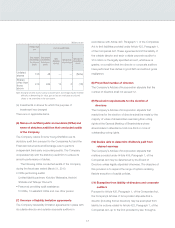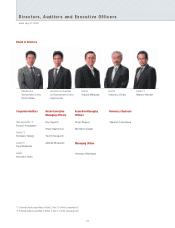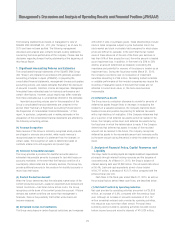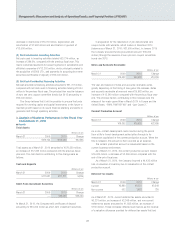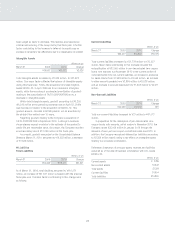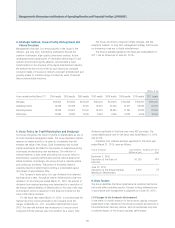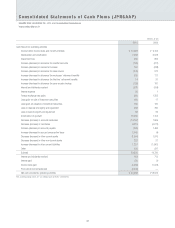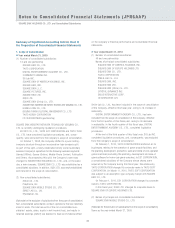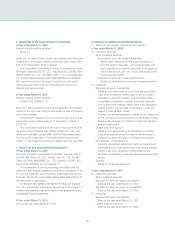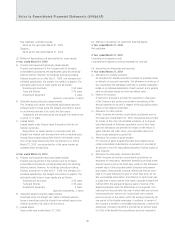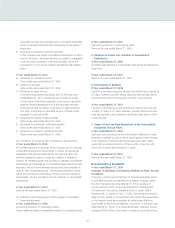Square Enix 2010 Annual Report Download - page 29
Download and view the complete annual report
Please find page 29 of the 2010 Square Enix annual report below. You can navigate through the pages in the report by either clicking on the pages listed below, or by using the keyword search tool below to find specific information within the annual report.
(2) The Group’s Ability to Respond to Changes in Consumer
Preferences in the Digital Content Market and the Rapid
Progress of Innovative Technology
It is possible that the Group’s substantial transformation stated in
“4. Strategic Outlook, Issues Facing Management and Future
Direction” may adversely affect the Group’s business performance
if the Group is unable to respond adequately and promptly to such
transformation.
(3) Changes in Game Platforms and the Group’s Response
The Group’s core business predominantly involves the sale of game
software for use on home-use video game consoles. Consequently,
the Group’s business may be affected by change in market shares
of console platforms caused by generational transition, and changes
in console manufacturers’ strategies.
(4) Securing Human Resources to Execute the Group’s Growth
Strategies Concentrating on the Creation of New Content
and the Promotion of Global Businesses
The Group has been making rapid progress in expanding its
business operations. Delays in securing ideally suited human
resources may adversely affect the Group’s business performance.
(5) Expansion in the Group’s International Business
Operations
As the Group pursues an expansion of its international business
operations, a variety of factors present in the countries and regions
in which the Group operates may affect the business performance.
Such factors include market trends, the political situation, economic
climate, laws and regulations, cultural factors, religious factors and
customs.
(6) Exchange Rate Fluctuations
The Group includes consolidated subsidiaries located in North
America, Europe and Asia. The risk of foreign exchange loss has
been reduced as foreign currency gained by those subsidiaries is
expended for settlement or reinvestment in the applicable countries.
However, sales, expenses, assets, liabilities and net assets of the
foreign subsidiaries are converted into Japanese yen amounts in the
consolidated financial statements. Consequently, exchange rates
may affect the Group’s financial results if they fluctuate beyond
management forecasts.
(7) Entertainment Industry Laws
The operation of amusement facilities is subject to government
control under the Law for Proper Control of Entertainment and
Amusement Businesses and other related laws and regulations.
These laws and regulations include an approval and licensing
system for the opening and operation of amusement facilities,
regulations on business hours (ordinances vary, but operation is
generally prohibited from midnight to 10 a.m.), age restrictions
(ordinances vary, but the admittance of persons under 16 years of
age after 6 p.m. and persons under 18 years of age after 10 p.m. is
generally prohibited), area restrictions on outlet opening, and
regulations concerning facility structures, interiors, fighting and
noise. While strictly complying with the laws and regulations, the
Group has actively pursued the establishment of new amusement
facilities.
However, if regulations were to change owing to the
establishment of new laws or other reasons, the Group’s business
performance may be affected.
(8) Management of Personal Information
With regard to the management of personal information, in
conjunction with the enactment of the Personal Information
Protection Law, the Group has bolstered employee training with the
aim of increasing awareness about the handling of personal
information. The Group has also identified all personal information
obtained by the Group, and improved the timeliness of its personal
information management systems. The Group has undertaken a full
range of measures to strengthen its internal control systems,
including ongoing improvements to technology controlling access to
its customer database and to its data security systems, restrictions
on personnel permitted to access information and establishment of
a monitoring system, and appropriate management of customer
inquiries. To date, no leakage of personal information has occurred
from the Group. The Group intends to maintain its stringent
management systems for personal information by reviewing current
systems and enhancing employee training. However, if a leak of
personal information were to occur from the Group, the Group’s
business performance may be affected.
(9) Accidents and Disasters
The Group periodically carries out accident prevention checks,
facility inspections, emergency drills and administers policies on
infectious diseases to minimize accidents and the potential impact
of disasters, including terrorist attacks, infectious diseases, food
poisoning, fires, electrical blackouts, computer system or server
malfunctions, earthquakes, typhoons, flood damage and other
accidents. However, in the event of an accident, disaster or
infectious disease affects the Group, it may not be possible to avoid
or alleviate all adverse impacts.
A major earthquake, accident or disaster including infectious
disease could impede the Group’s operations and affect business
performance.
(10) Litigation and Other Claims
The Group is being managed strictly in compliance with laws and
regulations and with full respect for third parties’ rights while
carrying out its operations. However, in the course of its business
activities in the global arena, the risk of the Group becoming a
defendant in litigation exists. If such litigation were to occur, the
Group’s business performance may be affected.
27


